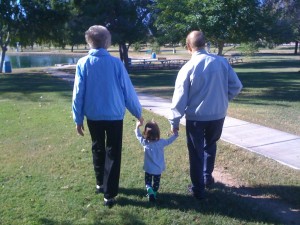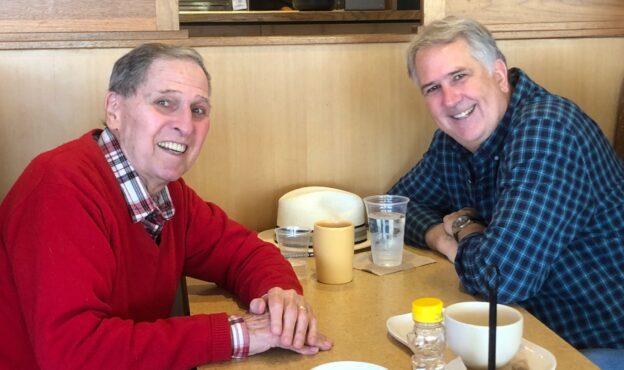The purpose of life is not spiritual growth. Spiritual growth is a means, not an end.
Most of us need so much work when we come to Christ that the refurbishment and restoration process dominates the agenda and our thinking, for years. This process is so important, so complicated, so personal, so powerful and such a work of God’s grace that after a while I got to thinking of spiritual growth and renewal as being the main thing, or even the only thing. It’s not.
Important, to be sure. Essential, even. But not the raison d’être.
“Moses my servant is dead.” Such was the abrupt, astonishing and perplexing first recorded introductory phrase when God began speaking directly to Joshua.
“Moses my servant is dead,” so started God’s call and challenge to Joshua. An era has closed. A new one has begun. “Now, therefore, arise, cross this Jordan, you and all this people.”
Moses was the main event for the preceding 40 years. He led. Joshua followed. Moses was the mentor; Joshua was the mentee, the apprentice. Moses did. Joshua watched and assisted. No more.
As a young adult, Joshua joined Caleb to stand against the tide of overwhelming popular opinion and societal pressure. Joshua and Caleb believed. Besides Moses, not one person in the entire nation did.
And then forty years passed. Through Moses, God inaugurated the tabernacle, the covenant and ordinances of sacrifice and the Law, and an entire nation and worship culture. For those 40 years, Joshua watched. He was in training.
But now: Moses my servant is dead.
The purpose of training is not to be trained. It is to step forward and use that training; to do the work of the ministry.
Ephesians 4 outlines equipping the saints. Equipping the saints is not the end goal. It is an intermediate goal. The end goal is for the saints to do the work of ministry.
At some point the season of preparation ends, and the season of doing begins.
My Grandfather, wealthy in good humor and good heart, but not so much in things financial, found an old rusty cross-cut saw blade. It did not even have a handle. With his characteristic persistence, he went to work grinding off the rust down to the steel core. He sharpened each one of the 208 teeth. Each one had to be individually filed, and bent to one side of the blade, alternating from the tooth before and after. Finally, he bolted on a new handle, and the tool of choice went into the tool box (which he had built).
But it did not stay there. Nor did it go on a pedestal or museum, worthy though it was. It went to work. On countless projects, big and small. He and my Dad (with my small hands in the way) built a full-scale play house, a room addition, fences, custom corner moldings, step stools and toy boxes for kids, and an automotive console cup and storage holder decades before plastic versions became ubiquitous.
The purpose of the saw was not to be restored. It was to cut things.
It took a while. Abraham Lincoln is attributed as saying that if he had eight hours to cut down a tree, he’d use six hours to sharpen his ax. It’s a worthy lesson, even if slight hyperbole.
Preparation and education are not to be undervalued. They are essential. But they are a launch pad, not a dock.
My risk is not to undervalue preparation, it is to get stuck there.
There comes a time when the preparation stage ends. It may or may not be closer to the end of one’s life than the beginning. One size does not fit all. For me, it is at 55 years of age, coincidentally about the same age Joshua was. It truly is coincidental, because there is no universal timetable, no calendar. Moses was 80. Abraham was 90+. Samuel and David were teenagers. The Apostle Paul spent 17 years in isolation and preparation after a lifetime of rigorous religious training and then his conversion. One notable example was 30.
It’s not that preparation, training and spiritual growth should ever stop. They just stop being the priority. I am to be a lifelong learner. And even during those preparation years, part of the preparation is to be doing, to be training in action, with a certain amount of on the job training, hopefully under effective supervision. Training and doing coexist. But there comes a day when the lead changes from training to doing. Moses my servant is dead. The saw is sharpened. It’s time to get baptized and change some water into wine.
Our Father has invested a lot in us. He has a purpose for us. His initial purpose may have been to rescue, to redeem, to restore, to cleanup, to prepare, to educate, to train, to equip. But at some point the purpose is to go!
Moses my servant is dead. Now get up. Get going. Be strong and courageous. Take the land. Lead. Do.
 I still have that saw, more than 50 years later. I still use it to cut things. The steel could use another polishing. And I wish my Grandfather was here to re-sharpen those 208 saw teeth. But those initial tedious hours he spent putting that saw into serviceable condition still make that saw what it is, a powerful, useful tool. As much as I treasure it and admire what it represents of my Grandfather’s thrift, and industry, I keep that saw where it belongs, not under glass, but in my tool collection, ready to be used on the next project, whether by me or the next generation or few. He would want it no other way.
I still have that saw, more than 50 years later. I still use it to cut things. The steel could use another polishing. And I wish my Grandfather was here to re-sharpen those 208 saw teeth. But those initial tedious hours he spent putting that saw into serviceable condition still make that saw what it is, a powerful, useful tool. As much as I treasure it and admire what it represents of my Grandfather’s thrift, and industry, I keep that saw where it belongs, not under glass, but in my tool collection, ready to be used on the next project, whether by me or the next generation or few. He would want it no other way.
In a large house there are not only gold and silver vessels (utensils, gear, tackle, implements, or tools), but also vessels of wood and clay, some for valuable, honorable and noble purposes, and some for ignoble, base or dishonorable ones. If one cleanses himself or herself from what is ignoble and dishonorable, he or she will be a vessel for honor, sanctified, set apart, useful to the Master, ready for every good work. 2 Timothy 2:20-21.
Moses my servant is dead …
~~~








